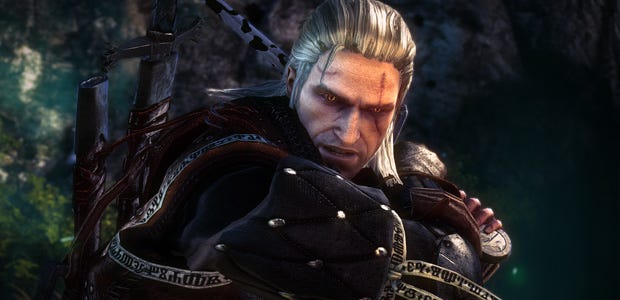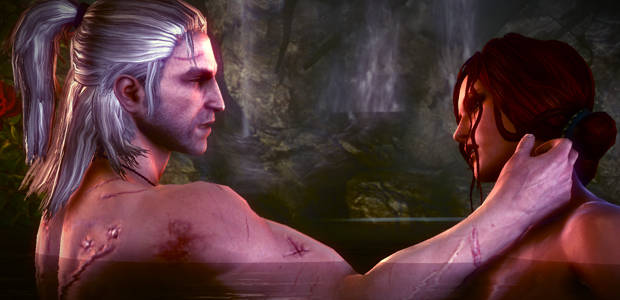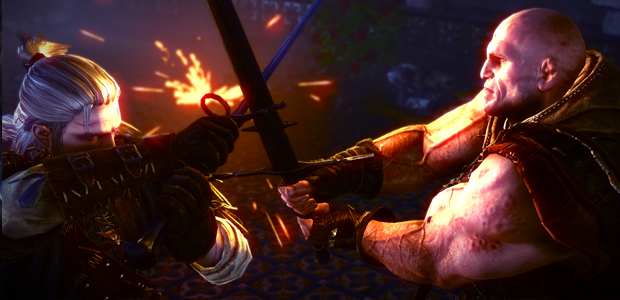Return To The Witcher 2: Part 1 - The Good Bits
That Rivia Touch
Now, if you're anything like me, you're really looking forward to The Witcher 3: Wild Hunt [official site] later this year, and you need to go to the gym a lot more. In anticipation of the first and avoidance of the second, I've been replaying the second game to refresh my memory and see a few things that I missed the first time round. With the benefit of hindsight, and a big update, where did it go right and where did it go wrong? Let's do the negatives tomorrow and start with the positives today, of which it has so many to choose from...
1) It had high ambitions
What stands out about The Witcher 2 is that everything about it feels like an attempt to do one thing: to be the best RPG in the world, whatever it takes. You don't get two completely different Chapter 2s - that only hardcore fans are going to go back to see the other side of - in a game where anyone is simply going through the motions. You don't get production values like this in a game willing to make compromises. I'm not going to rave about the graphics and sound too much individually, because there seems little point. This game would look great released right now. I do however want to just take one moment for the details that are so easily overlooked but which add so much to the experience, like the realistic way that villagers run for cover when it rains and the first village being redressed with lights for a party after a successful operation (or set on fire, elsewhere).
There have been many, many great RPGs over the years. Very few have felt as immediately special, or as deeply loved by their creators. It's a warm aura that flares early and never really fades.
2) It improved everything about the first game
While the number 2 in the name does rather give it away, it's hard... in the best possible way... to look at The Witcher and its sequel and imagine them being from the same company, never mind the same series. The original was distinctly ropey in just about every way, from its writing to quest design to its production values, particularly before the Enhanced Edition came along to salvage the slashed up script. Even with its problems, it was a game that marked CD Projekt Red as a company to watch, but Witcher 2 instantly made it a top tier RPG developer. It was a confident game in a way that few others without major backing can dare to be, from its high system requirements that harkened back to Origin in being based around what the game needed rather than what the majority of the players were going to have, to a powerful start that set both the mood and expectations with a very tight series of vignettes ranging from dragon attacks to non-glorified torture.
On top of that, it's hard to think of a sequel that seemed so willing to learn lessons instead of doubling down. No longer demanding things like buying books before hunting monsters. Making alchemy a higher-skill level thing to worry about so that the game wouldn't constantly stop to search for flowers. Nowhere near as much backtracking. Far more attention given to the characters and the flow of the story. An opening chapter that kicked everything off with a bang, rather than the original game's two or three chapters of pure tedium before the actual game starts.
Looking at the early materials for the third game, Wild Hunt, it seems unlikely that we won't see an equally impressive jump with its move to open world design (hopefully a little deeper than Bioware's implementation in Dragon Age Inquisition). Even now, another game using The Witcher 2's engine, approach, and its graphical fidelity would be more than enough to be a AAA game. The fact that CD Projekt Red has actively avoided churning something out to prove that fact is a great sign. The changes made in the Enhanced Edition also show a willingness to learn from mistakes.
3) It gave you choices which felt important
Rarely are your decisions in The Witcher 2 even close to black-and-white 'do you want the evil ending or not' affairs - instead, Geralt is stuck between forces as conflicted as any you'd find in real politics and rarely if ever knowing the whole story. That has its issues (see next time), but it also puts you in a really interesting position as a character - knowingly working from limited knowledge, and not from a position of authority or particular strength. Geralt is a fine soldier for any faction to have, but that's all, really. It's through accident more than fate that he ends up in the right place at the right/wrong time to swing things in various directions.
The same applies to much of the plot, with the big sweeping second act variant getting the headlines, but so many characters recurring and little decisions paying off in small ways throughout the game. Aryan for instance, from the tutorial, able to reappear later during a dungeon escape. In practice, there aren't actually that many big choices to make, but the ones that there are and the effects that they have make every small interaction potentially meaningful. That's important, especially in a world that feels far more fragile than the average RPG setting.
4) It handled its mature content maturely - mostly
Okay, we'll be back to this next time because there are absolutely a few points where Witcher 2 drops the ball hard enough to bounce it into space. After the unfortunate nonsense of the collectible cards in the first game however, it was a pleasant surprise to see The Witcher 2 take a step back and rethink and and try to improve how it handled that content.
Two particular scenes spring to mind - the first being the sex scene between Triss and Geralt in the Elven Ruins. It works not because of how much it does or doesn't show, but because it's true to the characters - her magical striptease, his awkwardness, a little joking around as she pulls him in with her, and an appropriate cutaway. Great. That works. It's a scene that gets to have its fan-service while still feeling like an encounter shared by two people and built on something more than "yay, we get to show some boobies now."
The second such encounter is later on, with Ves, one of the Blue Stripes. Here it's not the sex scene itself that works, which is fairly generic, but the lead-up to it. Geralt is challenged with fighting in an arena, with Ves as his final opponent after a series of victories. It's made clear that she's desperate to win the fight to prove herself to the others, and so a generous minded player might consider throwing the battle. Instead of course the correct path is to win, and in doing so actually show her the respect that she's trying to earn. (Technically, I suppose you could lose fairly, but by that point in the game Geralt is functionally invincible unless you go get a coffee mid-fight...) It's a well-executed scene that again plays well to the characters involved and their personalities.
5) Its combat was personal
A little like the original game, it's not the raw visceral nature of the combat that stands out (honestly, that's often The Witcher at its weakest), but the flow of it once proper abilities have been unlocked. Geralt's fighting style hits an excellent balance between actually fighting, and controlling someone trained down to the bones to do this for a living. Silly as the constant rolling around early on can look, it quickly becomes very satisfying just having a box of tricks at every turn, and to be able to execute often ballet-style displays of brutality against crowds of bigger, stronger enemies.
On the easiest difficulty levels, yes, you can bash through things without even thinking about it. Played on the tougher ones though, it's very satisfying to be playing not as a glorified fighter or rogue that any other game might have, but a Witcher with very specific ways of handling problems. Even if you go all out for magic, you're still a Witcher who uses magic rather than an outright mage, while an alchemy heavy Witcher still relies on his sword of steel and sword of silver. Having such a specific character, and one likely to knock all players at least a little out of their comfort zone, really helps the mood, as well as establishing in game and lore what you can do. In particular, this works well for the first and final encounters that you have with the villain, Letho, where he's likely to trounce you with his Witcher-specific skill-set in the first and then you're able to return the favour with interest at the end. The latter is a particularly fun fight because it doesn't give you any specific big advantage. It simply demonstrates how much you've come since your first match, up to and including being able to just walk away.
6) It showed respect for players
Now, this one has a sting in its tail, so we'll be back to it next time. As a general rule though, The Witcher 2 has a rare and blessed confidence in its players to do everything from learn how to fight to picking up on the details of a story that they can't even see a full half of during a single playthrough. Along with that, it goes out of its way to serve up good, complex quests rather than falling back on too much cheap collection stuff, to be willing to throw in tough fights from the very start, and to present its world without too much commentary. You don't need to be told for instance that Roche and Iorveth the terrorist elf guy aren't likely to paint the other in a good light. Nor is it ever really stated clearly (that I've seen, so it might be somewhere) that by mid-game nobody particularly gives a damn about whether Geralt actually killed a king or not. After all, they're far too busy trying to take advantage of the situation. That convenient regicide? Pffft. So last week.
That willingness to dive into the political side of things, and to have the hero stuck on the sidelines without so much as a prophecy to boost their importance is just one of many reasons The Witcher 2 feels so different. It's grimy, it's cynical, and you know that whoever you help, they're probably going to be a complete dick. Within Geralt's head though, it still works because he has his own motivations, and picking the best of a bad lot is far more interesting than good/evil.
7) It had a sense of humour
And despite it all, it has a sense of fun and life too; in the dialogues, in the cut-scenes, in random interludes like Geralt's unfortunate tattoo. Or CD Projekt's generously patched in response to Assassin's Creed 2's ridiculous feather-hunting fetch-quest...
What The Witcher 2 really nails is that the people you meet live and have history in this world, and what happens will have serious effects in their future. The common people will get hurt, the kings and sorceresses will play their games, the fall of nations has effects for both the world and specific people caught up in it. This isn't simply Geralt's playground in a way that, say, Skyrim is for the Dovahkiin, but a world that feels like it lives and breathes and where life goes on where you aren't. Just about every RPG tries to convey that feel, but very few actually succeed. With its political focus and close-knit group of recurring characters, The Witcher 2 managed it... even if it's not always clear exactly what's happened and what the larger implications of it are. (This, like many problems in the original release, was massively improved in the Enhanced Edition.)
And So Much More Good Stuff
I could go on, but we're already at around 2000 words here. The Witcher 2 is easily one of the best RPGs of the last few years, both in its own right, and as something to be built on. I can't wait for Wild Hunt to land, even if it does look like I'm going to need a RAM upgrade first.
But! Was The Witcher 2 perfect? No, of course not. Tomorrow, the things it got wrong, and more importantly, the things to hope that Wild Hunt has taken onboard and managed to fix...
This article was made possible by the RPS Supporter program.



